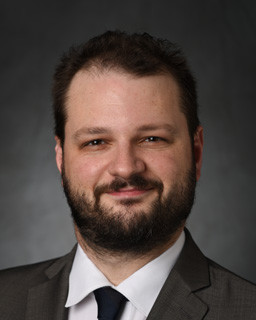
Elia Mezari IMAGE: Penn State
Nuclear engineering awarded grant to support early career faculty
Posted on November 26, 2019UNIVERSITY PARK, Pa. — The United States Nuclear Regulatory Commission (NRC) awarded Penn State’s Ken and Mary Alice Lindquist Department of Nuclear Engineering a faculty development grant. The award was established to encourage careers and research in nuclear, mechanical and electrical engineering, health physics and related fields to prepare for future workforce needs in society.
“This grant is designed to help junior and mid-career faculty move forward in the early to mid-stage of their careers,” said Jean Paul Allain, head of the department. “We are pleased that our department has been recognized as an environment that encourages our faculty members — especially our new faculty members — to grow into their research areas.”
The grant, worth about half a million dollars, will help support the research of newly hired faculty member Elia Merzari.
Merzari, associate professor of nuclear engineering, joined the department on Aug. 15 after 10 years at the Argonne National Laboratory in Illinois, where he still holds a joint appointment. He earned his bachelor’s and master’s degrees in engineering from Politecnico di Milano in Italy and his doctoral degree from the Tokyo Institute of Technology in Japan. At Penn State, he is also an associate in the Institute for Computational and Data Sciences.
“I’ve always wanted to make an impact, and I realized energy would be a key area to develop and deliver better options to a wide array of people to reduce climate change,” Merzari said. “The nuclear engineering program at Penn State has always been important in terms of research and educating the next generation of nuclear engineers — I’ve known about it for a long time. As soon as I saw a faculty position open, I jumped at the opportunity.”
Merzari works to bridge the gap between the theory of supercomputer-based simulation and engineering practice. He uses predictive large-scale simulations of turbulence to improve the understanding of complex, physical flows with the ultimate goal of designing safer and more efficient nuclear reactors.
“I’m also passionate about training future nuclear engineers,” Merzari said. “My research is at the nexus of physics, computer science and engineering. We need to equip nuclear engineers with the flexibility and knowledge to innovate. This will be essential to deliver the next generation of advanced reactors.”
According to Allain, the NRC grant helped recruit Merzari, and supported the initial start up of his research program at Penn State.
“Professor Merzari brings a wealth of expertise,” Allain said. “The NRC grant has helped establish him in our department, where he has quickly demonstrated the importance of understanding and further developing the connections between super computing and nuclear engineering.”
The NRC awarded 45 grants to 33 academic institutes in 19 states and Puerto Rico, totaling $15 million in fiscal year 2019.
“Ultimately, this grant helps us recruit and support the best researchers in this field,” Allain said. “We’re all excited to see the work that will be accomplished in our department.”
— by Ashley WennersHerron
